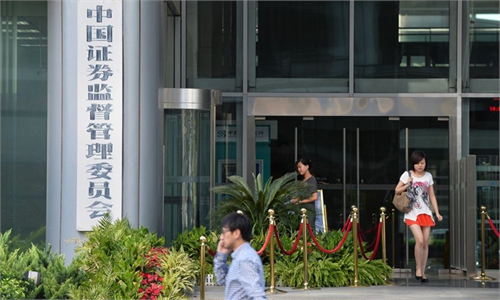China urges equal cooperation on audit issues, after 80 companies added to SEC list
US’ threat of delisting Chinese firms ‘loses effect’

A man walks near the New York Stock Exchange (NYSE) on August 31, 2020 at Wall Street in New York City.Photo: CFP
As the US moves to put dozens more Chinese firms on its list of companies that could face delisting, its threatening effect is obviously ebbing, and it has become an irreversible trend for these US-listed firms to prepare for homecoming listings, Chinese experts told the Global Times on Thursday.The US Securities and Exchange Commission (SEC) on Wednesday added more than 80 Chinese firms, including e-commerce platforms JD.com and Pinduoduo, to a list of entities facing possible delisting from US bourses, citing its so-called Holding Foreign Companies Accountable Act (HFCAA), which came into effect in December 2020.
Under the act, the SEC has the authority to delist foreign-based companies from exchanges if they fail to file reports required by the Public Company Accounting Oversight Board (PCAOB) for three consecutive years.
The 88 companies, the sixth batch to be added and now on the provisional list, have to provide evidence to the SEC by May 25 that they do not qualify for delisting. Otherwise, they will be placed on a conclusive list.
So far, there are 128 Chinese firms targeted, including 105 on the provisional list and 23 on the conclusive list, according to the SEC website. There are about 200 New York-traded firms with parent companies based in the Chinese mainland or Hong Kong.
JD.com said on Thursday that it is aware that the company has been identified by the SEC under the act, and that it has been actively exploring possible solutions.
"The company will continue to comply with applicable laws and regulations in both China and the US, and strive to maintain its listing status on both NASDAQ and the Hong Kong Stock Exchange," JD.com said in a statement.
The US regulatory body's fresh move did not trigger a massive sell-off in Chinese companies' American depositary receipts (ADRs) as it did in March, when the first batch was announced, as the market has already formed expectations that the list will grow longer, Wang Chao, founder of the Wenyuan Institute for Politics and Economics, a Beijing-based think tank, told the Global Times on Thursday.
"The market has gradually digested the impact of the SEC's delisting threat. We can see that such US moves to crack down on Chinese firms are losing their impact," Wang added.
At Wednesday's closing, JD.com's ADS were up 1.62 percent, and those of Baidu, the Chinese search engine giant that was added to the SEC list in March, were up 3.43 percent.
"China has always insisted on solving the audit and supervision issues of US-listed Chinese companies via equal cooperation, which is in the interests of the capital markets of both countries and global investors," Chinese Foreign Ministry spokesperson Zhao Lijian said on Thursday in response to the SEC move.
Being on the list does not mean that a Chinese company will be kicked out of a US exchange, since it depends on the progress and results of the audit and supervision cooperation between the two countries, Zhao noted.
Recently, the regulatory authorities of both sides have indicated to the media that the two sides are maintaining close communication on audit supervision cooperation and were striving to promote this cooperation. "We are pleased to see Chinese and US regulators could reach a cooperative arrangement that meets both regulatory requirements and legal requirements," Zhao said.
Fang Xinghai, vice chairman of the China Securities Regulatory Commission (CSRC), said at the Boao Forum for Asia annual conference on April 22 that "at present, the bilateral negotiations are going very smoothly, and we are confident that the relevant uncertainties regarding US-listed Chinese firms will soon be removed."
A meeting by the financial stability and development committee under China's State Council, the cabinet, said on March 16 that the two sides were working on a concrete cooperation plan.
"According to recent messages released by Chinese regulators, China is inclined to continue negotiations on the premise of maintaining the bottom line, like data concerning national security," Wang said.
Given the situation - that the dispute is likely to persist and even intensify - it is suggested that more Chinese firms prepare in advance for delisting, and it has already become a trend that many US-listed Chinese firms are coming back home for a dual or secondary listing, and Hong Kong has become a popular spot, Dong Shaopeng, an expert advisor for the CSRC, told the Global Times on Thursday.
Chinese property platform KE Holdings said on Thursday that it would list its shares in Hong Kong without raising capital. The New York-listed company, which operates online property platform Beike matching buyers and sellers of real estate, will start trading its shares on the Hong Kong Stock Exchange on May 11.


